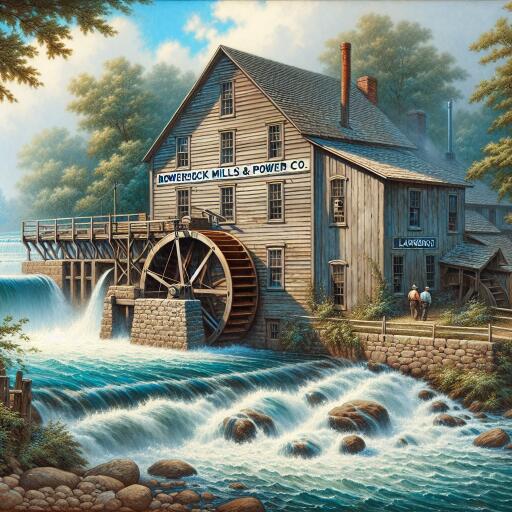
Celebrating 150 years of hydropower: Bowersock Mills & Power Co. marks a milestone in renewable energy for Lawrence
This year, the historic Bowersock Mills & Power Co. commemorates 150 years of producing sustainable energy in Lawrence, Kansas. Since its inception in 1874, this iconic establishment has powered the lives of local residents, standing proudly as the state’s only hydropower plant.
Situated by the Kansas River adjacent to Massachusetts Street, this hydroelectric plant is run by Sarah Hill-Nelson, a direct descendant of the plant’s original owner. Over the years, it has played a pivotal role in energizing the community, from powering the flour mills and a twine factory to supplying the needs of two grain elevators and even the Journal-World newspaper office. Today, Bowersock Mills remains steadfast in its commitment to harnessing renewable energy. “We trace our roots back to 1874 when the Douglas County Mills first utilized power from the dam,” remarks Hill-Nelson.
The legacy began under the stewardship of J.D. Bowersock, Hill-Nelson’s ancestor, who became a significant figure in the plant’s history in 1879. While Kansas is renowned for its wind power capacity—and rightly deserves recognition for ranking among the top five states in this field—hydropower remains an undervalued gem in the renewable energy landscape.
Stephen Hill, Sarah’s father and a former operator of the plant, often emphasizes the long life cycle and dependability of hydropower, describing it as the most economically viable form of energy generation. Unlike other forms of power, which may be decommissioned over time, hydroelectric facilities boast a robust longevity owing to their operational pace. “Hydroelectric equipment’s lifespan is remarkable,” says Hill. “As long as there is water, these generators could outlast many other power plants.”
After J.D. Bowersock’s era, the plant changed hands, eventually returning to the Hill family in 1972 with Stephen Hill at its helm. His wife, Marcia Hill, undertook the bookkeeping to manage the financial aspects of the plant effectively. The advantages of hydropower extend beyond longevity; it is also highly reliable. Unlike solar and wind technologies, which depend on specific weather conditions, hydropower production can be accurately predicted based on the water flow rate through the facility. Typically, the plant generates seven megawatts, but this output is directly affected by the Kansas River’s water levels.
The operational principle of the plant is ingeniously simple yet effective. As Hill-Nelson explains, water enters the facility, spilling over a runner akin to a massive fan, and exits afterward, generating energy in the process. Much like a child’s pinwheel spins under a running tap, the water’s movement drives the turbines and produces electricity. “We’re merely using the water’s weight, without polluting or consuming it,” said Hill-Nelson.
In an agreement initiated in 2010, all electricity generated by Bowersock goes to the Kansas City Board of Public Utilities under a 25-year power purchase contract. Addressing questions about why the energy isn’t kept local, Hill-Nelson describes the power grid as a giant pool interconnected through numerous channels. “Once you add power into the grid, it blends with everything else; you can’t differentiate its origin,” she explains, noting that local buildings near the plant inevitably draw on this power too.
To honor this remarkable anniversary, a celebration is planned on November 24th at the Bowersock Warehouse. The event serves as a gesture of gratitude to those who’ve supported river management and energy efforts over the decades. “Our operations rely on the Kansas River and those who help manage its resources,” Hill-Nelson said. “We work closely with all river stakeholders and cherish our collaborations that allow us to preserve and document this rich history.”





Leave a Reply